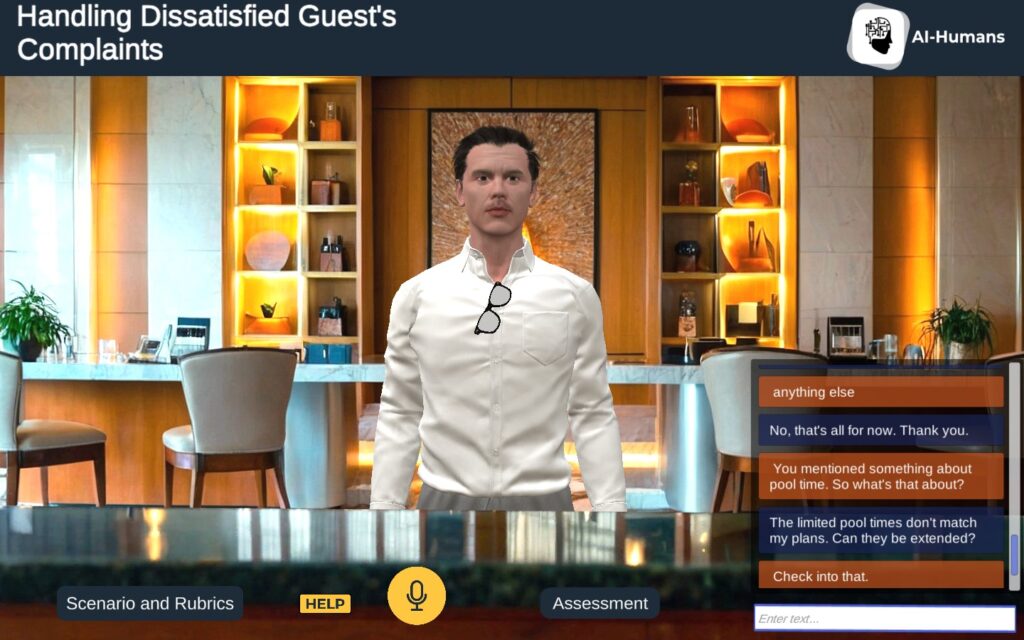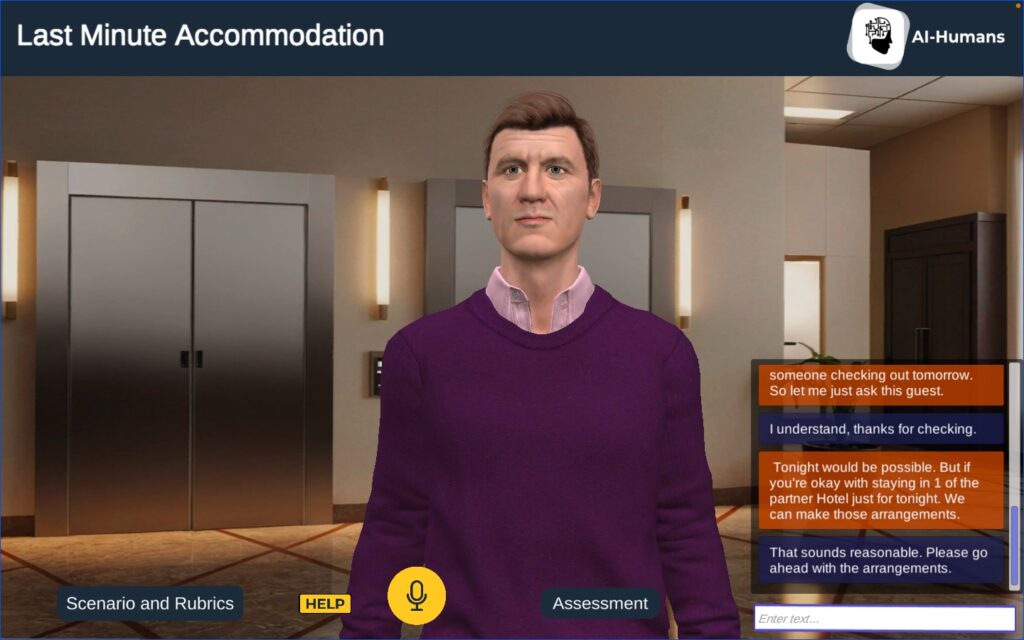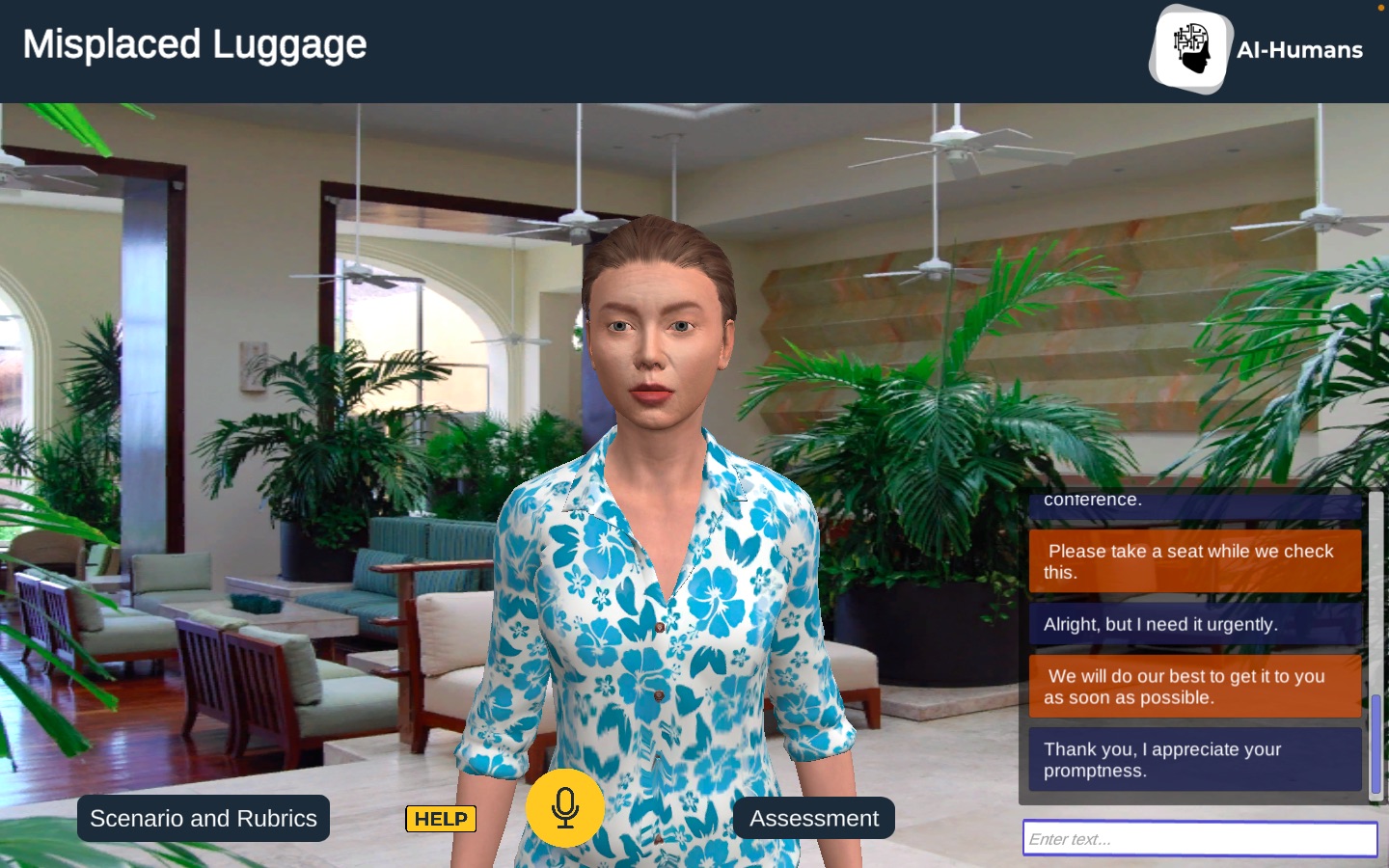When we say hospitality, we are referring a dynamic industry that has been playing a leading role in the global economy. This one single industry includes a range of services like travel, food and beverages, lodgings, recreation and event planning. In simple terms, the hospitality industry is all about providing guests a comfortable and memorable experience. This need not be limited to luxurious high-end hotels but is also applicable to small bed and breakfast establishments. It is all about how the host, that is the service provider, makes the guest feel. The host can leave a positive impression on the guest by practicing effective interpersonal skills, a key component in the successful running of an establishment in this sector. To ensure an impressive execution of services, training is a must. Opting for AI-based soft skills training is an effective, engaging and highly scalable means to provide quality training.
Dynamically growing hospitality industry
Owing to factors like globalization, better travel facilities, and increase in disposable incomes, the past few decades witnessed a significant growth in the hospitality industry. A bump came in this ride with the pandemic which hit the industry hard but that was only temporary. The sector is seeing a rebound with both domestic and international tourism on the rise. According to a Statista report, “an annual growth rate of 3.72% (CAGR 2024-2029) is expected, resulting in a projected market volume of US$511.90bn by 2029.”
With the industry growing at such a rapid rate, it is bound to require a workforce that can propel it in towards growth and expansion. This needs to be a skilled set of people who can deliver exceptional services; skills that come from fine training and quality practice opportunities.
Customer service skills required in the hospitality industry
The hospitality industry is all about providing a hospitable experience to guests. It flourishes on the happiness and satisfaction of patrons. It is the quality of services that distinguishes one hotel from another. To guarantee exceptional services, it requires efficient customer relations, which includes a range of skills. Using AI-based soft skills training is an effective way to develop them.
Communication Skills – The hospitality industry involves a large degree of interactions. This could be with guests, among team members, or third-party suppliers. Reasons could range from communicating services and amenities, conflict resolution or problem solving. For each aspect, effective communication is essential, be is verbal or non-verbal.
Empathy and Emotional Intelligence – Interpersonal relations call for an empathetic approach towards others. It is necessary to understand the needs and requirements as well as their concerns. This helps create a positive atmosphere, makes the guest feel important and special and can help provide a comfortable and memorable experience.

Problem-Solving Abilities – When a guest complains about unsatisfactory services, the ability to think on one’s feet is crucial. A hotel executive must be able to provide quick solutions to problems or assure the guest of prompt action. Staying away from home, guests rely upon the hotel for a comfortable stay and the hotel must look into every aspect to ensure this.
Attention to Detail – On a broad perspective, the basic services in every hotel remain the same. However, it is the smaller details that make a big difference; things like making special arrangements for the elderly, taking special care about cleanliness, asking about food preferences, providing pick and drop facilities, offering a welcome gift, etc.
Leadership and teamwork – The successful execution of duties, a guaranteed comfortable stay for every guest and smooth running of business is ensured by a well-coordinated team working in harmony. This calls for excellent teamwork among the staff and an efficient leader to lead the way.
Adaptability and Flexibility – While the hotel and its staff try to ensure the best of services to every guest, there are bound to be guests who have special preferences, or shall we say quirks. Maintaining a flexible and adaptable attitude comes very handy in such circumstances.
Importance of soft skills in hospitality at different levels
Managing the business, looking into inventory management, analyzing data etc. are skills that call for technical knowledge. No doubt, these skills are important to successfully run a business but when it comes to the hospitality industry, equally important are soft skills. This industry runs on customer satisfaction. A great deal of interaction is involved to achieve this goal, not just with the guests, but also among coworkers.
Coworker Relations – Teamwork in the hospitality industry works as a glue that keeps the ship sailing smoothly. Take for example an occasion where are guest places an order for a meal to be delivered to their room. This requires the kitchen staff and the waiters to work in tandem. If the food is prepared and the waiter does not carry it to the room, there can be a problem. For each department to work in harmony, cordial relations must be established and maintained.
Manager-Subordinate Relations – This is another critical area where interpersonal soft skills play an important role. When a manager acknowledges and praises the efforts of their subordinates, it creates a positive and healthy atmosphere. Subordinates feel valued and honored, giving them a boost to work harder and better. The manager exhibits fine leadership skills in showing appreciation for good work resulting in creating improved experiences for guests.
Customer Relations – There would be no hospitality if there were no guests. Guests are the energy that keep the industry running and hence, the most important part it. Maintaining a healthy and positive relationship with guests is the key requirement. Guests must feel welcome, valued and cared for. If a guest has a special food requirement, arrangements should be made to honor the guest’s request. This makes them feel cared for and special, transforming an ordinary stay into an exceptional one.
Developing customer service with AI-bases soft skills training
With so much significance attached to customer relations, having a trained and skilled staff becomes extremely important. Training in hospitality skills cannot be taught through books or lectures. This is a practical field and needs on the job training. However, making mistakes on the job can prove to be disastrous. One of the best and safest ways to practice these skills is through simulations. The integration of AI can enhance the effectiveness of these trainings.
Simulation-Based Learning – Simulations powered by AI provide realistic, interactive and engaging learning scenarios. AI-driven virtual characters can replicate different types of guests and coworkers to provide learners with a range of experiences. A guest could be demanding, displaying anger at noisy fellow guests, be worried about misplaced luggage, or maybe requesting a last minute accommodation. Handling each situation requires skills that come from practice.

Personalized Feedback and Coaching – AI-powered learning scenarios provide personalized feedback. This feedback is a detailed analysis of the user’s performance, highlights the strengths and points out the weaknesses. As it is provided instantly after a training session, it provides better understanding of the corrections to be made to ensure better performance.
Continuous Learning and Development – Skills in the hospitality industry need to be polished on a regular basis. Simulations like those offered by AI-Humans can be accessed anytime, anywhere. Users can have access to training content on-demand, enabling them to upskill themselves and stay relevant in the industry.
The hospitality industry has always been a dynamic and vibrant one. A key factor that drives it is customer relations and interpersonal skills. In such a scenario the significance of soft skills remains paramount. Be it guest relations, relations among coworkers or manager subordinate relations, soft skills are required to maintain a positive and healthy relation. Using AI-based soft skills training is an effective method to provide realistic training in controlled environments.
AI-Humans from ELDC is a SaaS-based platform that enables trainers to develop AI-powered durable skills training solutions within minutes. While all technical aspects of creating these AI-powered scenarios have been taken care of by the team, trainers can devote all their attention towards giving shape to highly effective and relevant training and provide learners with engaging and immersive training opportunities. Practicing durable skills is the best way to learn and this is precisely what AI-Humans is providing.

